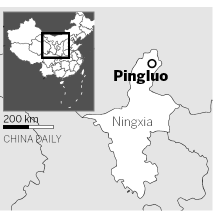Villager becomes e-commerce leader

Ten years ago, Ma Jingzu was a construction worker in a village in Guyuan, the poorest city in the Ningxia Hui autonomous region. He barely knew about computers and the internet.
Due to the dry climate, high mountains and harsh environment in the area, some villages in Guyuan were relocated from the southern arid land to northern parts of the autonomous region thanks to a poverty relief program.
Ma was one of the villagers who moved to Miaomiaohu village, Pingluo county, in 2011.
A year after he moved there, he saw a TV program introducing e-commerce to rural areas.
"I was suddenly struck by the idea and wondered why didn't we sell our specialties and handicrafts online," he said.
At first he tried to persuade villagers to open their own online shops and sell their products.
However, those who had just settled down for a steady life after the relocation didn't trust him or his e-commerce plan. No one followed his advice. Even his wife didn't agree.
"But I was firm in my belief that introducing e-commerce to the countryside would be beneficial," he said.
He then pivoted his strategy by purchasing specialties from villagers and selling them on his own online shop at Taobao.
The move was risky, because villagers got paid upfront while he carried the risks.
He borrowed 200,000 yuan ($28,500) from the bank, with interest subsidized by the local government, to run his online shop. Money was spent buying products and cooperating with logistics companies.
But the risky move made him into what he is now: a leader in the county's e-commerce business.
His online shop developed smoothly, with about 14,000 orders every year.
As people were getting more familiar with online shopping, he expanded his e-shop in 2015 into an e-commerce station, settled in a two-story building with a yard covering 310 square meters.
The station's services include procurement, e-commerce training, livestreaming, information consulting and delivery.
Locals can buy products online with the help of staff or pick up things they buy.
Last year when selling goods online, Ma called on villagers to participate and trained them to become livestreamers.
In the training area on the second floor of the station, a dozen villagers can learn new techniques like how to operate smartphones, shoot photos and produce videos. Outside the building in the yard, livestreamers set up booths to sell their products online.
On a sweltering Sunday in mid-June, about 10 booths in the yard were selling local specialties such as goji berry, mutton and homemade handicrafts.
Sellers at each booth were standing outdoors in front of a smartphone, explaining the value of their products in a passionate voice and interacting with viewers watching the livestream.
Ma Rui, a 26-year-old villager, was livestreaming and selling her handicrafts on Kuaishou, a short video platform.
"This is a woolen miniature landscape I made myself. Go and buy it to decorate your office desk," she told her audience.
In 2018, her beautiful woolen handiwork was noticed by Ma Jingzu, who bought them for 20 yuan each and put them on sale at his e-shop. In two years' time, Ma Rui has sold 450 handicrafts she made, which brought in about 2,000 yuan each month on average.
Seeing the benefit of e-commerce, she opened a livestreaming account earlier this year to sell her handwork and has attracted 1,000 followers.
As a member of the 400-strong livestreaming team led by Ma Jingzu, she received training at the e-commerce station.
Han Xiaoshuang, one of more than 30 trainers, said the training, including technical guidance in livestreaming and shared experiences, enabled these villagers to know more about local products and earn more money.
"The home isolation amid the coronavirus outbreak hatched a lot of livestreamers. More and more people in various industries found that we could sell our specialties to the whole country without leaving home," she added.
For Ma Jingzu, he plans to establish a livestreaming association to drive e-commerce development in the village and help villagers live a richer life. He said he would focus more on the quality of local products.


Today's Top News
- Mayors from around the world gather in Qingdao for dialogue
- Premier announces construction of Yarlung Zangbo hydropower project
- Digital countryside fueling reverse urbanization
- 'Sky Eye' helps unlock mysteries of the universe
- China offers LAC development dividend
- Future sectors to receive more play






























